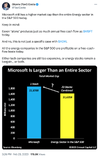- Joined
- 3 November 2013
- Posts
- 1,573
- Reactions
- 2,783
Hit FNGD stops yesterday, but I think we're setting up for another down legView attachment 153518
Oh dear. Good thing I sold SOXL yesterday huh?
0.6 vs estimated 0.4 month on month too.
Still in your short position bottle?






